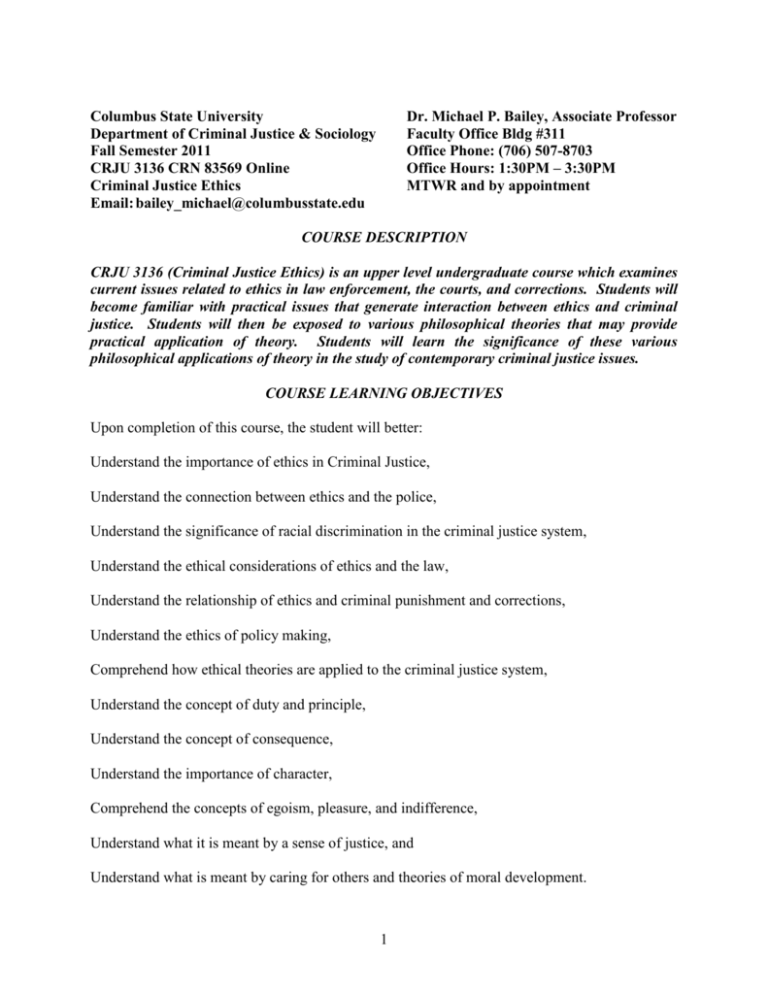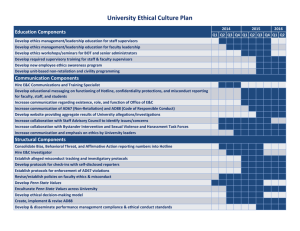DOC - Criminal Justice - Columbus State University
advertisement

Columbus State University Department of Criminal Justice & Sociology Fall Semester 2011 CRJU 3136 CRN 83569 Online Criminal Justice Ethics Email: bailey_michael@columbusstate.edu Dr. Michael P. Bailey, Associate Professor Faculty Office Bldg #311 Office Phone: (706) 507-8703 Office Hours: 1:30PM – 3:30PM MTWR and by appointment COURSE DESCRIPTION CRJU 3136 (Criminal Justice Ethics) is an upper level undergraduate course which examines current issues related to ethics in law enforcement, the courts, and corrections. Students will become familiar with practical issues that generate interaction between ethics and criminal justice. Students will then be exposed to various philosophical theories that may provide practical application of theory. Students will learn the significance of these various philosophical applications of theory in the study of contemporary criminal justice issues. COURSE LEARNING OBJECTIVES Upon completion of this course, the student will better: Understand the importance of ethics in Criminal Justice, Understand the connection between ethics and the police, Understand the significance of racial discrimination in the criminal justice system, Understand the ethical considerations of ethics and the law, Understand the relationship of ethics and criminal punishment and corrections, Understand the ethics of policy making, Comprehend how ethical theories are applied to the criminal justice system, Understand the concept of duty and principle, Understand the concept of consequence, Understand the importance of character, Comprehend the concepts of egoism, pleasure, and indifference, Understand what it is meant by a sense of justice, and Understand what is meant by caring for others and theories of moral development. 1 TEXTBOOK Ethical Dilemmas & Decisions in Criminal Justice, 7th Edition, by Joycelyn M. Pollock The textbook for this course is required. Students will be responsible for assigned readings. All assigned readings are testable material. The lecture portion of this course is designed to supplement, not substitute for the required reading of the text. COURSE REQUIREMENTS Due dates and subject matter for tests and papers/projects will be announced when the class is posted online. Tests may be fill in, multiple choice, true/false, short answer, or essay. The final exam will be given as listed in the Schedule of Courses for finals. Examinations will not be given at any other time than other than scheduled and announced by the professor. One research topic may be required. If assigned, the topic will be selected by the student and approved by this professor. It should deal with a contemporary ethical issue in policing. The paper will be a minimum of five (5) pages (double-spaced), and no more than seven (7) pages. The number of references will be at least five, and can include no more than two internet resources. It will be worth a maximum of 100 points and will be graded on the following criteria: 1. Provides a good discussion and exhibits critical analysis of a pertinent issue in modern police management. 2. Contains a clear organizational pattern, to include an introduction, a body, and a conclusion. The conclusion will include a comprehensive summary of the paper. The term paper will be graded on the same standard as that used on essay questions. GRADING SYSTEM Your final grade will be the average of all cumulative points (total points divided by number of assignments or projects). A B C D F I 90 - 100% 80 - 89% 70 - 79% 60 - 69% 0 - 59% Incomplete 2 STANDARD FOR ANY ESSAY QUESTIONS AND/OR RESEARCH PAPERS 1. 2. 3. 4. Includes key concepts ........................…...................... Demonstrates continuity in relating concepts .............. States your answer or view clearly, and provides sufficient detail to support your answer ..................…. Correct use of grammar, punctuation, and spelling .…. 20 percent 40 percent 30 percent 10 percent ETHICAL CONSIDERATIONS Cheating, Plagiarism: Cheating is not acceptable! If you enroll in Ethics, this professor will view you as a student of criminal justice (regardless of your major), and cheating is seen as particularly ill conceived (by this professor) if done by a student of criminal justice. Plagiarism is cheating on an assignment by trying to pass off someone else's work as your own. Do not paraphrase or quote without use of proper citations. Any student caught cheating or plagiarizing, will receive a zero ("0") resulting in an “F” for the course. There will be no opportunity for extra credit to any student caught cheating. Any student wishing to discuss a possible change of score or grade on an exam or paper must make an appointment with the professor to discuss the issue in private. No open class discussions of alternative answers will be accepted. Individual arguments will be measured according to their logic and credibility. A SPECIAL NOTE CONCERNING ETHICAL STANDARD OF CONDUCT If you are working toward receiving a degree in the study of criminal justice, you should keep in mind that standards of ethical behavior are high in this particular field. If you see yourself not being able to maintain the ethical standard that is expected, you might want to consider changing your course of study. Cheating and plagiarism are just two examples of academic misconduct (simply being charged with a criminal offense could be an example of behavior that might lead you to fail assignments, fail the course, be removed from study in the Criminal Justice & Sociology Department, and/or be expelled from school altogether). Remember, also,… most occupations require a certain number of letters of recommendation and referral before you can be hired. Most professors (I am included in this group) will not provide such letters if the ethical standard of the discipline has not been met. Very little leniency is given in these particular incidents. The choice is yours. (See Columbus State University Student Handbook concerning academic and/or behavioral misconduct) 3 NOTE: ADA ACCOMMODATION STATEMENT (Americans with Disabilities Act): "If you have a documented disability, as described by the Americans with Disabilities Act of 1990 (ADA) and the Rehabilitation Act of 1973, Section 504, you may be eligible to receive accommodations to assist in programmatic and physical accessibility. We recommend that you contact the Office of Disability Services in Schuster Student Success Center, room 221, 706-507-8755 as soon as possible. The Office of Disability Services can assist you in formulating a reasonable accommodation plan and in providing support. Course requirements will not be waived but accommodations may be able to assist you to meet the requirements. Technical support may also be available to meet your specific need." http://disability.colstate.edu/faculty_policies_procedures_a.asp#ada_syllabus More complete information can be found at http://disability.colstate.edu 4 TENATIVE CLASS SCHEDULE (Subject to change by professor) Important Dates Class Begins Aug 15th, 2011 (Monday) Refunds: Total Withdrawal 100% Aug 11th – 19th, 2011 Schedule Change (Full Term) Drop/Add Courses (100% Refund) Aug 16th – 19th, 2011 Deadline to Withdraw (Full Term) Sep 9th, 2011 Midterm Oct 6th, 2011 Fall Break Oct 10th – 11th, 2011 Thanksgiving Holiday Break Nov 23rd – 27th, 2011 Classes End Dec 5th, 2011 Final Exam TBA Week One: Week of Aug 15th, 2011 Read: Chap 1 Morality, ethics, and human behavior. Defining terms, Morality and the law, Morality and behavior, analyzing ethical dilemmas Week Two: Week of Aug 22nd, 2011 Read Chap 5 2 Determining moral behavior. Ethical systems, deontological and teleological ethical systems, religion, natural law, the ethics of virtue, the ethics of care, egoism relativism, absolutism, situational ethics Week Three: Week of Aug 29th, 2011 Read Chap 3 Justice and the Law. Origins of the concept of justice, Distributive justice, Corrective justice, Immoral laws and the moral person, restorative justice. Week Four: Week of Sep 5th, 2011 Read Chap 4 Becoming an ethical professional. Theories of moral development, Biological factors, Learning Theory, Kohlberg’s Moral Stage Theory, Ethics teaching and training, Leadership and the Ethical Organization, the Criminal Justice Professional. Week Five: Week of Sep 12th, 2011 Read Chap 5 The police role in society. Crime fighter or public servant, community policing, authority and power, formal ethics for the police officer, police subculture, discretion, duty, and discrimination Week Six: Week of Sep 19th, 2011 Read Chap 6 Police Discretion and Dilemmas. Discretion and Discrimination, Racial Profiling, Discretion and Criminal Investigation, Discretion and the Use of Force. Week Seven: Week of Sep 26th, 2011 Read Chap 6 7 Police Corruption and Misconduct. A world-wide problem, Types of Corruption (Gratuities, professional courtesy, On-Duty use of drugs and alcohol, Graft, Sexual misconduct, Criminal Cops), explanations of deviance (individual, organizational, and societal) Week Eight: Week of Oct 3rd, 2011 Exam # 1 Covers Chaps 1, 2, 3, 4, 5, 6, and 7 Fall Break Read Chap 8 Law and Legal Professionals. The role of law, Justification of law (preventing harm to others, preventing offensive behavior, preventing harm to self, preventing harm to societal morals), paradigms of law (Consensus, Conflict, and Pluralist) Week Nine: Week of Oct 10th, 2011 Week Ten: Week of Oct 17th, 2011 Week Eleven: Week of Oct 24th, 2011 Read Chap 9 Discretion and Dilemmas in the Legal Profession. Ethical issues for defense attorneys (responsibilities to the client, conflict of interest, zealous defense, confidentiality), Ethical issues for prosecutors (use of discretion, conflicts of interest, plea bargaining, media relations, expert witnesses, zealous prosecution) Read Chap 10 Ethical misconduct in the Courts and Responses. “First, Let’s kill all the lawyers…”, ethical misconduct (defense attorney misconduct, prosecutor misconduct, judge misconduct), justice on trial, explanations for misconduct, responses to misconduct Week Twelve: Week of Oct 31st, 2011 Read Chap 11 The Ethics of Punishment and Corrections. Rationales (retribution, prevention), Ethical frameworks (Utilitarianism, Ethical Formalism, Ethics of Care, Rawlism Ethics), Punishments (supermax & 7 private prisons, capital punishment, community corrections) Week Thirteen: Week of Nov 7th, 2011 Read Chap 12 Discretion and Dilemmas in Corrections. Correctional officers (relationships with inmates, use of force, maintaining morality in prison, jail officers), treatment staff, probation and parole officers, Avoiding burnout and disillusionment Week Fourteen: Week of Nov 14th, 2011 Read Chap 13 Correctional Professionals: Misconduct and Responses. Misconduct and Corruption (treatment professionals, corruption in the community), explanations for misconduct, responses to corruption, restorative justice Week Fifteen: Week of Nov 21st, 2011 Nov 23rd thru 27th, 2011 Read Chap 14 Making Ethical Choices. Just wars and just means, the responses to 9/11, crime control versus rightsbased law enforcement, Ethical dilemmas and decisions Thanksgiving Break Week Sixteen: Week of Nov 28th, 2011 Exam # 2 th nd (Nov 28 thru Dec 2 , 2011) Covers Chaps 8, 9, 10, 11, 12, 13, and 14 Will be administered according the schedule of Finals dates appearing on the calendar for Fall 2011 8 Read, sign, and return this portion to the professor. Course ________________ I have received a syllabus for the above course and have been instructed to read and become familiar with the course requirements. _______________________________ Signature _________________________ Printed Name _______________________________ Student Identification Number _________________________ Date 9





